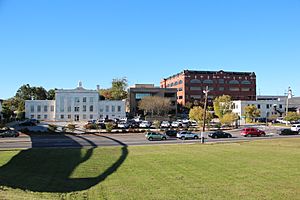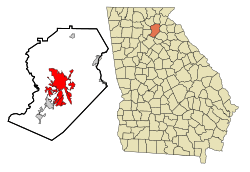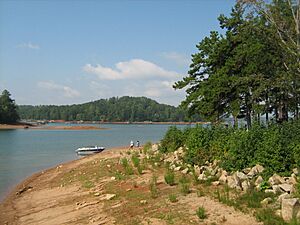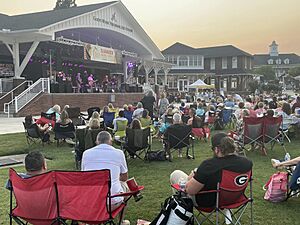Gainesville, Georgia facts for kids
Quick facts for kids
Gainesville, Georgia
|
||
|---|---|---|

Downtown Gainesville
|
||
|
||
| Nicknames:
"Queen City of the Mountains",
"Poultry Capital of the World" |
||

Location in Hall County and the state of Georgia
|
||
| Country | United States | |
| State | Georgia | |
| County | Hall | |
| Gainesville | 1818 | |
| Named for | Edmund P. Gaines | |
| Area | ||
| • City | 35.37 sq mi (91.61 km2) | |
| • Land | 33.42 sq mi (86.57 km2) | |
| • Water | 1.95 sq mi (5.04 km2) | |
| Elevation | 1,214 ft (370 m) | |
| Population
(2020)
|
||
| • City | 42,296 | |
| • Density | 1,265.4/sq mi (488.57/km2) | |
| • Urban | 164,365 (US: 219th) | |
| • Urban density | 1,102.1/sq mi (425.5/km2) | |
| • Metro | 203,136 (US: 217th) | |
| Time zone | UTC-5 (EST) | |
| • Summer (DST) | UTC-4 (EDT) | |
| ZIP Code |
30501, 30503-30504, 30506-30507
|
|
| Area code(s) | 770 | |
| FIPS code | 13-31908 | |
| GNIS feature ID | 2403675 | |
Gainesville is a city in Georgia, United States. It is the county seat of Hall County, Georgia. In 2020, about 42,296 people lived there. Gainesville is often called the "Poultry Capital of the World." This is because it has many chicken processing plants. It is also the main city of the Gainesville Metropolitan Area. This area is part of the larger Atlanta–Sandy Springs–Gainesville region.
Contents
History of Gainesville
Gainesville started as a settlement called Mule Camp Springs. European-American settlers founded it in the early 1800s. On April 21, 1821, its name changed to Gainesville. This was to honor General Edmund P. Gaines. He was a hero from the War of 1812. He was also known for surveying and building roads. The Georgia Legislature chose Gainesville to be the county seat. It officially became a city on November 30, 1821.
Early Growth and Challenges
A gold rush started nearby in Lumpkin County, Georgia in the 1830s. This brought more settlers and businesses to Gainesville. In the mid-1800s, two big things happened. In 1849, Gainesville became a popular resort town. People came to visit its natural springs. Then, in 1851, a large fire destroyed much of the small city.
After the American Civil War, Gainesville began to grow again around 1870. In 1871, the Airline Railroad started stopping in Gainesville. This helped connect the city to other markets. It also boosted business and population. The city grew from 1,000 people in 1870 to over 5,000 by 1900.
Modern Developments in Gainesville
By 1898, textile mills were the main part of the economy. The railroad was important for bringing in cotton and taking out finished products. With money from the mills, Gainesville became the first city south of Baltimore to get street lamps in 1902. Mail delivery started in 1905. The city's first skyscraper, the Jackson Building, opened in 1915.
City services began in Gainesville in 1873. They started with a City Marshal and then trash collection in 1874. In 1890, the city built its first water system.
During World War II, Gainesville helped the war effort. In 1943, the city leased its airport to the U.S. government for just $1. The military used it for training. In 1947, the airport was returned to the city. It had been improved with two long landing strips.
After World War II, a businessman named Jesse Jewell started the poultry industry. This made chickens the biggest farm crop in Georgia. This industry is worth over $1 billion a year. It gave Gainesville its nickname, "Poultry Capital of the World."
In 1957, Lake Sidney Lanier was created. The U.S. Army Corps of Engineers built Buford Dam on the Chattahoochee River. This man-made lake covers over 38,000 acres. It is a popular spot for outdoor fun. It is one of the most visited lakes created by the Corps in the nation.
Gainesville was a host city for the 1996 Summer Olympics. The rowing and kayaking events took place on Lake Lanier.
In 2001, Gainesville's Parks and Recreation Department earned special recognition. The Lakeside Water Treatment Plant opened in 2002. The city also started new events like the Spring Chicken Festival.
Geography of Gainesville
Gainesville is located at 34°18′16″N 83°50′2″W / 34.30444°N 83.83389°W.
The city covers about 29.1 square miles (75.4 square kilometers). About 27.1 square miles (70.2 square kilometers) is land. The rest, about 2.0 square miles (5.2 square kilometers), is water.
Gainesville is in the foothills of the Blue Ridge Mountains. Parts of the city are along the shore of Lake Lanier. This lake was created in 1956. The U.S. Army Corps of Engineers built a dam on the Chattahoochee River. The lake was made mainly for electricity and flood control. It also provides water for Atlanta. Many people visit the lake for fun.
Much of Gainesville has many trees. Both deciduous (trees that lose leaves) and coniferous (evergreen) trees grow here.
Transportation in Gainesville
Major Roads for Driving
 Interstate 985
Interstate 985 State Route 347
State Route 347 U.S. Route 23
U.S. Route 23 U.S. Route 129
U.S. Route 129 U.S. Route 129 Business
U.S. Route 129 Business State Route 11
State Route 11 State Route 11 Business
State Route 11 Business State Route 13
State Route 13 State Route 53
State Route 53 State Route 53 Connector
State Route 53 Connector State Route 60
State Route 60 State Route 60 Connector
State Route 60 Connector State Route 284
State Route 284 State Route 365
State Route 365 State Route 365 Business
State Route 365 Business State Route 369
State Route 369
Paths for Walking and Biking
- Highlands to Island Trail (Under construction)
- Midtown Greenway
- Wilshire Trails
Public Transportation Options
- The Gainesville Amtrak station is a train stop. The Crescent train connects Gainesville to cities like New York, Philadelphia, and Atlanta.
- Gainesville's local bus system, Gainesville Connection, was replaced by WeGo in 2021.
Airport for Air Travel
- Lee Gilmer Memorial Airport (GVL) is owned by the city. It has two runways and supports different types of flights. Many small planes, jets, and helicopters use this airport. Gainesville also has three heliports for helicopters.
Economy of Gainesville
The Poultry Industry
The poultry farming industry in Gainesville started after World War II. Jesse Jewell, a local feed salesman, began his business. He would sell baby chicks and feed to farmers on credit. When the chickens grew, Jewell would buy them back. This helped farmers make a profit. Once he had enough farmers, he opened his own processing plant.
Today, poultry farming is still a huge part of Gainesville's economy. Six of the top ten employers in the city are poultry companies. This industry brings in over $3 billion statewide each year. Many Hispanic workers have moved to Gainesville for these jobs. This has made the city's population very diverse.
Top Employers in Gainesville
Here are some of the biggest employers in Gainesville:
| # | Employer | # of Employees |
|---|---|---|
| 1 | Northeast Georgia Health System | 5,030 |
| 2 | Fieldale Farms | 2,400 |
| 3 | Pilgrim's | 1,600 |
| 4 | Mar-Jac | 1,250 |
| 5 | Kubota | 960 |
| 6 | Coleman Natural | 900 |
| 7 | The Longstreet Clinic | 580 |
| 8 | Koch Foods | 521 |
| 9 | ZF | 440 |
| 10 | MP Equipment | 110 |
Culture and Arts in Gainesville
Arts and Theater Scene
Gainesville is home to the Gainesville Theater Alliance (GTA). This group works with Brenau University and the University of North Georgia. They put on plays and shows for the community. GTA uses both professional and student actors. Their performances have won national awards.
Brenau University Galleries opened in 1985. They have five art galleries on the historic campus. These galleries hold over 5,000 pieces of art. They also feature local, regional, and national art shows. The galleries offer free public programs and exhibits.
The Northeast Georgia History Center is a museum in Downtown Gainesville. It teaches about the history of the Northeast Georgia region. You can see exhibits like the Land of Promise. It also has the Northeast Georgia Sports Hall of Fame.
The Arts Council is a group that brings different types of art to Gainesville. They offer visual arts, performances, and literary events. The Arts Council is located in the Smithgall Arts Center. This building used to be a train depot. In 2020, they started building a new outdoor stage. This stage, called the "Gladys Wyant Performing Arts Pavilion", opened in 2021. It is a popular place for events in Gainesville.
The Quinlan Visual Arts Center is a non-profit art group. It started in 1942. The Quinlan Center has many art galleries that change throughout the year. It also hosts events and offers art classes for kids and adults.
The Gainesville Symphony Orchestra (GSO) was a volunteer orchestra. It started in 1982. However, it closed in 2013 due to money problems.
Gainesville is also home to the Gainesville Ballet Company. They work with Brenau University. One of their popular shows is Tchaikovsky's The Nutcracker.
Alta Vista Cemetery is a historic graveyard. The famous Confederate general James Longstreet is buried here. Other notable people buried there include Georgia governors and the poultry pioneer Jesse Jewell.
Population Information
| Historical population | |||
|---|---|---|---|
| Census | Pop. | %± | |
| 1860 | 344 | — | |
| 1870 | 472 | 37.2% | |
| 1880 | 1,919 | 306.6% | |
| 1890 | 3,202 | 66.9% | |
| 1900 | 4,382 | 36.9% | |
| 1910 | 5,925 | 35.2% | |
| 1920 | 6,272 | 5.9% | |
| 1930 | 8,624 | 37.5% | |
| 1940 | 10,243 | 18.8% | |
| 1950 | 11,936 | 16.5% | |
| 1960 | 16,523 | 38.4% | |
| 1970 | 15,459 | −6.4% | |
| 1980 | 15,280 | −1.2% | |
| 1990 | 17,885 | 17.0% | |
| 2000 | 25,578 | 43.0% | |
| 2010 | 33,804 | 32.2% | |
| 2020 | 42,296 | 25.1% | |
| U.S. Decennial Census | |||
Gainesville Population in 2020
| Race | Num. | Perc. |
|---|---|---|
| White (non-Hispanic) | 17,852 | 42.21% |
| Black or African American (non-Hispanic) | 6,033 | 14.26% |
| Native American | 60 | 0.14% |
| Asian | 1,450 | 3.43% |
| Pacific Islander | 29 | 0.07% |
| Other/Mixed | 1,222 | 2.89% |
| Hispanic or Latino | 15,650 | 37.0% |
In 2020, Gainesville had 42,296 people. There were 13,314 households and 8,796 families living in the city.
Gainesville Population in 2010
In 2010, the city had 33,804 people. The population density was about 1,161 people per square mile. About 54.2% of the people were White. About 15.2% were African American. A large part, 41.6%, were Hispanic or Latino.
About 30.3% of households had children under 18. The average household had 2.85 people. The average family had 3.55 people.
The median age in Gainesville was 29.5 years. About 33.9% of the population was under 20 years old. About 29.1% of the population lived below the poverty line.
Healthcare in Gainesville
Gainesville is home to the Northeast Georgia Medical Center Gainesville. This hospital has a special trauma center. It also has the Georgia Heart Center.
Education in Gainesville
Three African Americans were important in education in Gainesville. Beulah Rucker started Timber Ridge Elementary School in 1911. This was the first school for Black children in Gainesville. E. E. Butler became one of the first Black men on the Gainesville City Schools Board in 1954. Ulysses Byas was a principal who later became the first Black school superintendent in the nation.
Historical Schools in Gainesville
E. E. Butler High School was a school for Black students. It was created in 1962. It closed in 1969 when public schools became integrated.
Gainesville City School District
The Gainesville City School District serves students from pre-school to twelfth grade. It has five elementary schools, one middle school, and one high school. There are over 4,438 students in the district. Gainesville High School has many famous alumni. These include football players Deshaun Watson and Cris Carpenter. The school mascot is the Red Elephant.
Hall County School District
The Hall County School District also serves students from pre-school to twelfth grade. It has twenty-one elementary schools, six middle schools, and seven high schools. There are over 21,730 students in this district. Many notable people have graduated from these high schools. They include football players Connor Shaw and A.J. Styles.
Private Schools in Gainesville
Gainesville has several private schools. Riverside Military Academy is a boarding and day school for boys. It serves grades 6 through 12. Lakeview Academy is a day school for all students from preschool to 12th grade. Brenau Academy was a school for girls that closed in 2011.
Higher Education in Gainesville
Gainesville has several colleges and universities. The University of North Georgia was formed in 2013. It combined two other colleges. Brenau University is a private university. It offers both undergraduate and graduate degrees. Other colleges include the Interactive College of Technology and Lanier Technical College.
Law and Public Services
The Public Defender's Office in Gainesville helps people accused of serious crimes. It was started in 2005. Lawyers from this office are known for helping the community.
Notable People from Gainesville
- Tommy Aaron, a professional golfer who won the Masters in 1973.
- Jodi Benson, a voice actress famous for playing Princess Ariel.
- Roy D. Bridges, Jr., an astronaut.
- Casey Cagle, a former Lieutenant Governor of Georgia.
- Cris Carpenter, a former professional baseball pitcher.
- John Casper, an astronaut.
- Doug Collins, a member of the U.S. House of Representatives.
- Jody Davis, a former professional baseball player.
- Nathan Deal, the 82nd Governor of Georgia.
- Dexter Fowler, a professional baseball player.
- John Driskell Hopkins, the bassist for the Zac Brown Band.
- Corey Hulsey, a former NFL football player.
- Tasha Humphrey, a professional basketball player.
- Sung Kang, an actor.
- James Longstreet, a Confederate general who moved to Gainesville.
- Micah Owings, a professional baseball pitcher.
- Randy Pobst, a professional racing car driver.
- Robert Prechter, a financial forecaster.
- Blake Sims, a former University of Alabama quarterback.
- AJ Styles, a professional wrestler for WWE.
- Deshaun Watson, a quarterback for the Cleveland Browns (NFL).
- Margaret Woodrow Wilson, daughter of U.S. President Woodrow Wilson.
See also
 In Spanish: Gainesville (Georgia) para niños
In Spanish: Gainesville (Georgia) para niños
 | Emma Amos |
 | Edward Mitchell Bannister |
 | Larry D. Alexander |
 | Ernie Barnes |




